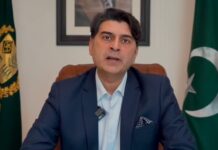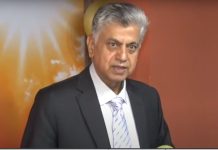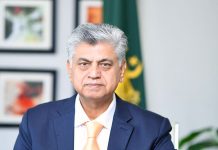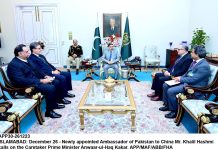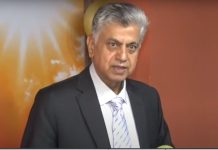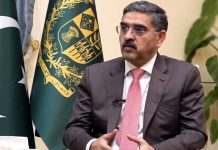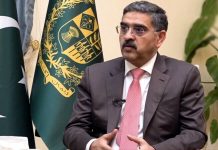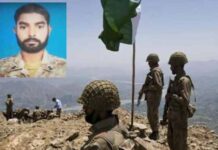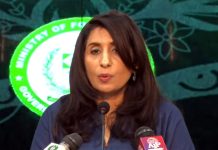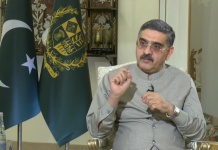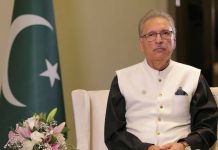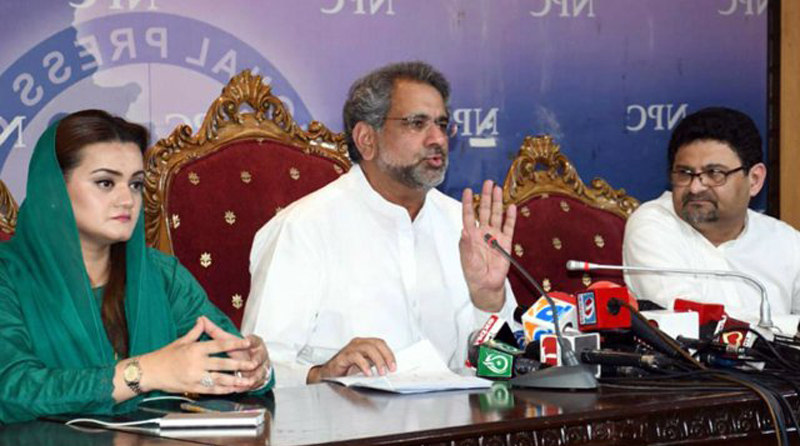
Addressing a news conference in the federal capital, former prime minister Shahid Khaqan Abbasi, flanked by PML-N leaders Marriyum Aurangzeb and Miftah Ismail, said that the party was compelled to put the facts before the nation. “The country’s economy cannot be run by selling cars and buffaloes,” he remarked.
The PML-N vice president presented several charts and graphs, comparing the PTI government’s first 10 months in power with his party’s rule in the subsequent months last year.
In the past 10 months, he lamented, rupee had devalued by 27 percent, electricity tariffs increased by 20 percent, gas tariffs jacked up by 153 percent, petrol price hiked by Rs 23, diesel by Rs 24 and LNG price by almost 8 percent. Prices of sugar, flour, chicken, meat, lentils and all grocery products had also gone up, he added.
Abbasi said the National Assembly was being made redundant, compelling the party to bring the facts to fore through a press conference. “If need arises, we will topple the government in the larger interest of the country,” he said.
The former premier said the economy had stagnated, with national security and foreign policy subdued before economy. “I hope the National Security Committee assessing the situation,” he said.
Abbasi said the “experiment of selected government had failed” and “PEMRA has silenced the media over the reference against judges, which is an attack on freedom of judiciary … we will not let anyone usurp the rights of judiciary.”
He said a fall of Rs 400 billion to Rs 500 billion in revenue was expected, adding that 50 percent of the total revenue was generated through imports. He said that in the current fiscal year, the tax revenue would remain around Rs 4,000 billion. He said the running expenditures from previous years were Rs 5,800 billion, while in 2019, these would go up to Rs 7,000 billion. “The Public Sector Development Programme (PSDP) was slashed by 30 percent, internal debts have reached the level of Rs 28,600 billion and external debt has increased to $80 billion, while growth rate has reduced to three percent,” he said, and added that the developmental expenditure has decreased by Rs 320 billion. “When we left the government, total debt was Rs 25,000 billion, which has gone beyond Rs 28,000 billion and will reach Rs 30,000 billion by the end of the current fiscal year,” he said.
He said the gross domestic product (GDP) last year was $313 billion, which had reduced to $280 billion. “National security and foreign policy have subdued before economy… the nation’s right to self-determination is at stake,” he said, adding that the white paper was aimed at showing the nation where the economy stood on May 31, 2018 and where it stood on the same date this year.
Meanwhile, opposition parties lashed out at the government after yet another increase in the prices of petroleum products. Petroleum prices in the country hit the highest-ever mark on June 1 after the government announced a four percent increase in oil prices for the month.
The adjustment was made even though the international crude market price is at $67 per barrel, which is almost half of the 2008 highest record of $147 when retail prices stood below Rs 80 per litre.
A private news channel reported that the crude price had dropped by 7 percent in the Arabian Gulf Market – the source of Pakistani imports – over the last month from $72 on April 28 to $67 per barrel on May 29, but the currency devaluation caused the major negative impact.
Pakistan People’s Party (PPP) Vice President Sherry Rehman, in a statement on Saturday, condemned the rise in rates and said, “The failed government has given nothing [to the country] except inflation and unemployment in the past nine months. The revolutionary administration has increased oil prices by Rs 20 within nine months.”
She pointed out that petroleum prices had decreased by 3 percent globally, but the government still announced an increase. Noting that the rise comes days before the budget, she asked if the step was taken on the directives of the International Monetary Fund.
On the other hand, Opposition Leader in National Assembly Shehbaz Sharif, who is currently in London for medical treatment, termed the price hike as “economic terrorism” and regretted that Prime Minister Imran Khan’s government had dropped a “petrol bomb on the public instead of providing them relief” right before Eidul Fitr. “Imran’s ‘Naya Pakistan’ has taken this country on the cusp of economic crisis,” he said.

